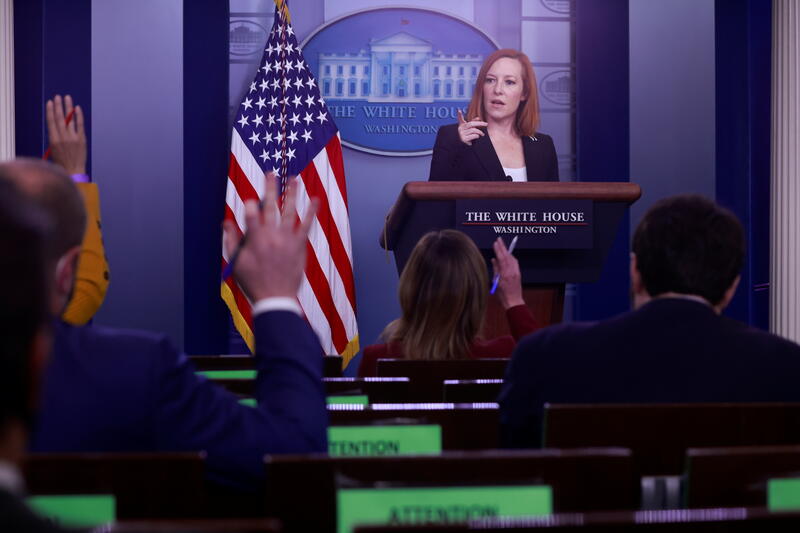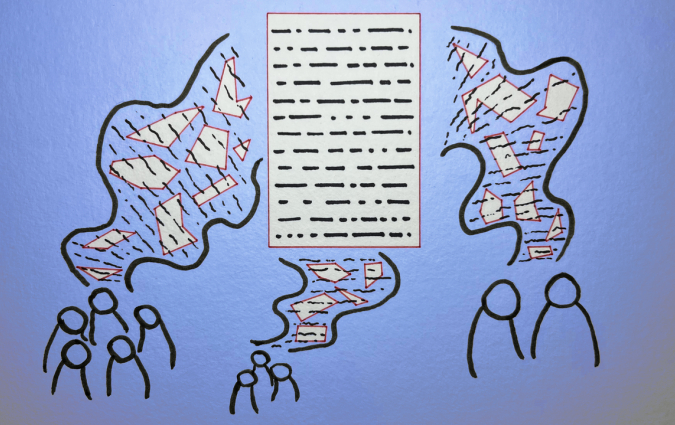Presentations from the Reuters Institute at the 2021 International Journal of Press/Politics Virtual Conference

White House Press Secretary Jen Psaki picks a journalist for a question at the White House in Washington, U.S., April 21, 2021. REUTERS/Tom Brenner
As the virtual conference hosted by the International Journal of Press/Politics begins see abstracts of the papers that will be presented by Reuters Institute researchers. Subjects covered include incidental exposure to news, perceptions of impartial news and trust in news.
Neither absent nor ambient: A more holistic view of incidental exposure to news in the digital age
Ruth Palmer, Benjamin Toff
The high choice digital media environment has generated concern that incidental exposure to news may be diminishing (Prior, 2007). While social media platforms may be one avenue where incidental news exposure still occurs (Fletcher & Nielsen, 2018), recent studies (Thorson et al, 2018; Thorson, 2020) have offered more pessimistic evidence for some segments of the public, showing how algorithms classify users according to their interest in news using indicators such as whether they and their friends have engaged with news in the past. This creates ecosystems in which some people “attract” lots of news on social media, while others may see none at all. These findings have led to calls for more research into how people who do not seek out news and are unlikely to attract it online might nonetheless still end up being exposed to it anyway (Thorson, 2020).
This paper takes up that question. Based on over a hundred interviews with people in the UK, Spain, and the US who report little-to-no news consumption and little-to-no interest in politics, we examine how people who “by rights should be unattractive to news” (Thorson, 2020, p. 1074) are still at times serendipitously exposed to it. Using four in-depth case studies, we explore incidental exposure through social interactions at home; at work; through jokes that circulate on messaging apps and offline; and in public places such as public transit. We pay close attention to the conditions in place for these forms of incidental exposure to occur as well as what they feel like to non-news-users. We argue that these areas warrant further research and offer recommendations for how they might be exploited to help people who do not seek out news become informed, even in a media environment that seems increasingly rigged against it.
Session: Understanding patterns of news consumption, avoidance, and sharing
“Fair and balanced”: What news audiences in four countries mean when they say they prefer impartial news
Camila Mont'Alverne, Sumitra Badrinathan, Amy Ross Arguedas, Benjamin Toff, Richard Fletcher, Rasmus Kleis Nielsen
Impartial news, or news without a partisan slant or overt point-of-view, is overwhelmingly preferred by news audiences worldwide (Newman et al., 2021), yet what such preferences mean remains poorly understood. In previous research, we find specific groups (older men with higher political interest) are more likely to say they prefer impartial news but also that such views are typically associated with lower rather than higher levels of trust. In this study, we examine whether people who say they prefer impartial news are referring to forms of balanced coverage as understood by journalists and scholars or whether, instead, they are voicing discontent towards news that purports to be impartial but which they think is not. We draw on qualitative interviews and focus groups with 132 individuals in Brazil, India, the UK, and the US, conducted in early 2021.
Our results show while the idea of impartial news is widely embraced, impartiality in practice is highly subjective. Our results also show that perceived violations of impartiality were not only about the content of news itself but often about hidden agendas believed to be influencing editorial decision-making. Many were skeptical of news sources that purported to be impartial but who they thought were out to “manipulate” unsuspecting audiences. Some cross-country differences were apparent but mainly as a matter of degree or the relative influence of partisan versus commercial factors. These findings suggest building back trust requires convincing audiences not only that news content is balanced and bias free but also that editorial decisions were not based on ulterior motives—a much more challenging proposition.
Session: Debating the normative foundations of the news
The role of political partisanship for the relationship between trust in the news and trust in the government as sources for coronavirus information: Findings from two cross-sectional online survey studies in six countries
Anne Schulz, Richard Fletcher, Rasmus Kleis Nielsen
This study investigates the relationship between trust in news and trust in politics (“trust nexus”) that previous research has shown to be strong and growing over time (Hanitzsch et al., 2017). We ask (i) whether this relationship holds in the coronavirus pandemic when people assess news media and government as sources of coronavirus information (rather than as institutions) and (ii) whether individuals’ political orientation (left-right self-placement) moderates this relationship. We use cross-sectional online survey data from six countries (UK, US, Germany, Spain, Argentina, South Korea) collected in March 2020 (N=8522) and in May 2021 (N=8843) to investigate these relationships. Bivariate correlations show a positive association between trust in news and trust in the government as sources for coronavirus information in all countries and at both measurement points, strongly supporting the trust nexus. However, the strength of the correlation varies across countries and changes over time in some. Most remarkably, from being the weakest across countries in the USA in 2020 (r=.16, p<.001) it turned into the strongest in 2021 (.77, p<.001) following national elections between our measurement points that led to a switch from a Trump (Republican) to a Biden (Democrat) administration. Using regression analysis, we find that political partisanship moderates the trust nexus in some countries. Although the association is always positive, it is weaker among left-wing individuals in the UK, Argentina and South Korea. In all other countries, however, political ideology does not affect the trust nexus, meaning that no matter how polarised a country might be on other dimensions, people who trust/distrust the news also likely trust/distrust the government. This aligns with work on ‘generalised scepticism’, which argues that if people have low trust in news they tend to be more sceptical of all sources.
Session: Communicating COVID-19







